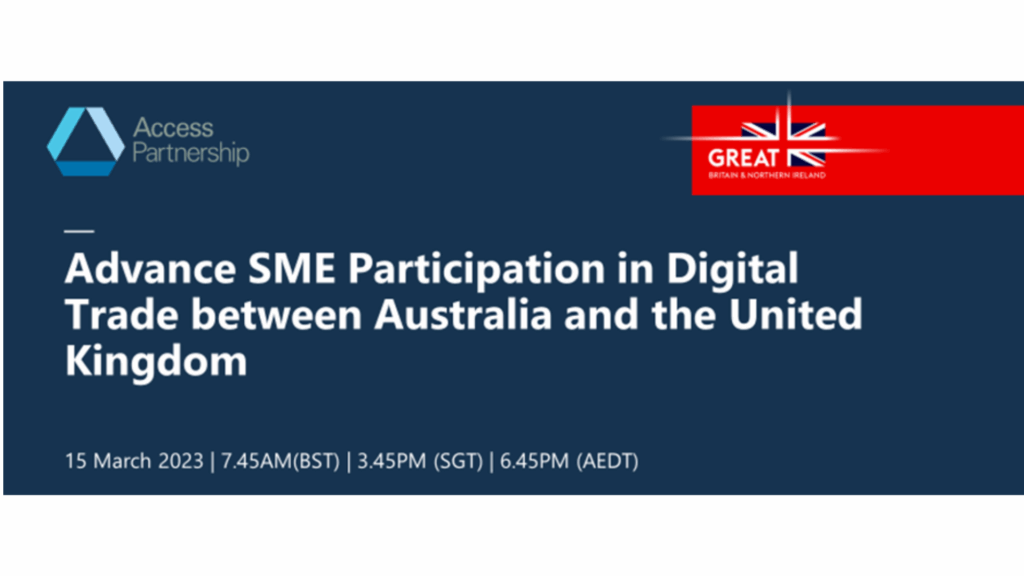

The Australia-United Kingdom Free Trade Agreement (A-UKFTA) recognises that digital technologies are increasingly important within the global economy and offer significant social and economic benefits. Innovations in trade technology, cross-border payments, cybersecurity, logistics, and customs services have significant potential to enhance trade facilitative solutions and strengthen digital trade. However, the adoption of these innovations is often hindered by low awareness of the FTA and information asymmetry between services/system providers and users.
On 15 March 2023, Access Partnership and the UK Government jointly organised an online workshop to encourage small and medium-sized enterprises (SMEs) based in Australia or the UK to participate in digital trade. The workshop was in support of the A-UKFTA and brought together policymakers, digital solution providers, and SME representatives to identify priorities, challenges, and solutions to deepen digital trade between the two economies.
Digital trade in the context of this workshop included both digitally traded goods and services (e.g., e-commerce, online content) and digitally-enabled trade of goods (e.g., e-invoicing, anti-counterfeiting technology). Participants were organised into two breakout rooms to encourage deeper discussions on the digitalisation of SMEs and SME participation in digital services trade.
Three Main Takeaways from the Workshop:
- SMEs are typically resource (time and cash) constrained, and navigating international trade requirements can make expanding overseas seem like a daunting task. Major challenges include identifying the right market opportunity, understanding customs and logistics requirements, complying with data and cybersecurity regulations, and accessing trade finance.
- Digital solutions stand to minimise these challenges for SMEs. However, information asymmetry between service/solution providers and users is still a major barrier to adoption. There is also a need for the regulatory environment to stay abreast of today’s technological advancements and to introduce policies that enable greater adoption of existing digital solutions to ease international trade challenges.
- Policymakers, business chambers, and other organisations can help demystify real and perceived barriers to digital trade for SMEs. Policymakers should take into consideration SMEs’ circumstances when setting baseline accreditation/regulatory requirements. Businesses can also establish a space or community to share and be informed of best practices on how to comply with different regulations in a new market or on existing solutions that businesses can leverage to enter and scale up in that new market.
Insights shared during the workshop will be used to help inform policymakers on best practice approaches for the successful implementation of the A-UKFTA. Feedback on further topics or themes that could be explored in similar discussions with the UK government is welcomed and may be used to help inform policymakers in improving guidance on the A-UKFTA or in future trade agreements.
Please refer here for further details on the workshop’s key takeaways.
Access Partnership supports governments, businesses, and philanthropic organisations to advance the digital trade agenda in the region. To learn more, please reach out to [email protected] and [email protected].
